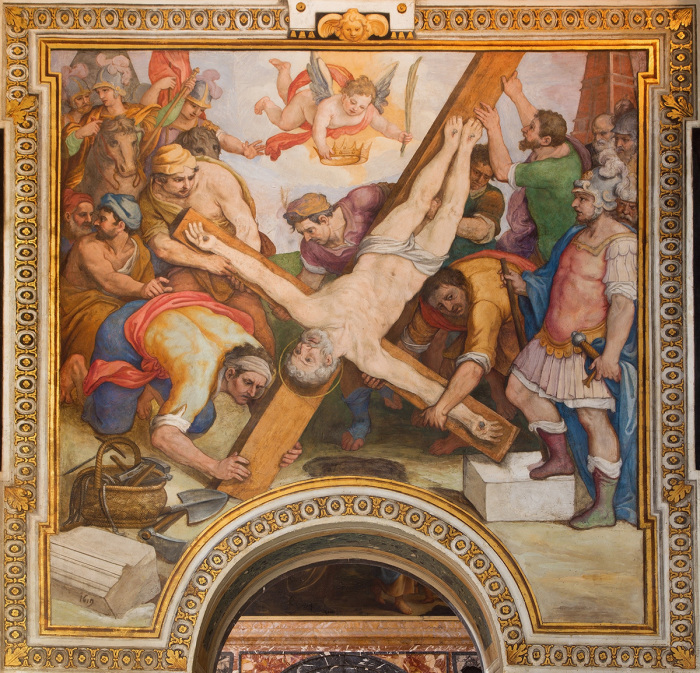How did the Apostles Peter and Paul die?

Why do we know so little about the deaths of arguably the two greatest apostles in the Bible?
It’s a question that has stymied scholars and laypeople alike, one that seems to run counter to the multiple accounts of deaths in Scripture ranging from figures such as Judas, the most notorious apostle, to seemingly less significant figures like the sons of Korah in the Old Testament or Ananias and Sapphira in the book of Acts.
But astoundingly, the Bible says nothing about the deaths of Peter and Paul.
As Jordan Smith, lecturer of Biblical Studies at the University of Iowa, points out, the deaths of Peter, Paul nor any of the other apostles are recorded in the New Testament.
According to Smith, our best source of information on the deaths of Peter and Paul are from extra-biblical sources, most of which contradict others on a number of details, including approximate dates and locations of their deaths.
“For instance, did you know that we have fifteen different versions of the deaths of Peter and Paul — four of Peter, five of Paul, and six of Peter and Paul together — all written by the sixth century?” writes Smith.
Here’s what we do know: Paul is still alive preaching in Rome at the end of Acts, and at some subsequent point in time, both he and Peter were executed by Nero. Their deaths have traditionally been linked to 64 AD, during a period of persecution against Christians, who Nero blamed for the Great Fire of Rome.
According to Roman historian Tacitus, the fire began in July of that year in the Circus Maximus, the ancient Roman stadium, and burned for five days.
Nero, who some accused of ordering the fire to be started, “substituted as culprits, and punished with the utmost refinements of cruelty, a class of men, loathed for their vices, whom the crowd styled Christians,” wrote Tacitus in his Annals.
But for Smith, the idea that Nero blamed Christians for the Great Fire is “highly unlikely” since they weren’t a “large and distinct enough group yet in Rome in 64 CE to provide a believable scapegoat.”
“For instance, in his correspondence with the emperor Trajan in 112 CE, Pliny the Younger mentions that he has encountered accusations against a group that he knows nothing about that were called ‘Christians,’" he wrote. “Trajan’s reply reveals that he has not heard of this group before, either.
“This would not be possible for a group that less than 50 years earlier Nero infamously blamed for the Great Fire in Rome.”
Smith says there are two lingering traditions associated with the deaths of Peter and Paul: Peter was supposedly crucified upside down “because he felt he was unworthy to be crucified in a manner similar to Jesus,” and Paul, a citizen of Rome who could not be lawfully crucified, was executed by beheading instead.
While there are a number of different versions of Peter’s crucifixion account, Smith says it wasn’t until the sixth century History of Shemon Kepha the Chief of the Apostles that we’re told his request to be crucified upside-down was for the purpose of dying while “symbolically kissing the place of Jesus's feet.”
Early Church fathers Origen and Jerome are said to have depicted Peter’s death as a tradition of “humility,” according to Smith.
As for Paul, Smith says one account of his death “bears a strong resemblance to the story of Eutychus in Acts 20.”
Smith writes, “A servant, perhaps cupbearer, of Nero fell asleep in a window listening to Paul and fell to his death. After he was raised from the dead by Paul, the resurrected servant upset Nero by acknowledging Jesus as the ‘eternal king,’ leading Nero to discover that many others among his own [bodyguards] were Christians.”
While details vary in later retellings, Nero is said to have ordered the Christians arrested and Paul beheaded, according to Smith.
He believes, despite the various later accounts of the apostles’ deaths, any mention of them in the canonical list appears to have been “a conscious decision” made by the early Church.
“Perhaps the idea was to focus only on their lives,” Smith wrote. “Maybe it is because by the time the Gospels were written, the Apostles had dispersed and the stories of their deaths were unknown.
“Or, maybe the anonymous Gospel authors simply didn’t think that any of the death traditions could be trusted, and excluded them for this reason.”
It's not clear what Smith meant by "anonymous" authors, since we have known since the first century the identity of each Gospel author:
- Matthew was written by the apostle Matthew, also known as Levi;
- The author of Mark, the second Gospel account, was Mark the son of Mary, Barnabas’ sister;
- Luke, a physician who was close to the apostle Paul according to Colossians 4:14, 2 Timothy 4:11, and other texts, authored the Gospel of Luke; and
- Early church tradition strongly and consistently identified the Apostle John as the author of the Gospel of John, who repeatedly refers to himself as the "disciple whom Jesus loved."
Ultimately, is the manner of how the apostles died relevant to 21st century Christians?
Darrell Bock, senior research professor of New Testament Studies at Dallas Theological Seminary, told The Christian Post the fact that some apostles gave their lives for the faith is important.
"It shows they truly believed in what they preached about Jesus," said Bock. As for how they died, the idea that Peter was crucified upside down because he did not feel worthy of dying exactly how Jesus did says a great deal about the humility of this apostle."
Ian M. Giatti is a reporter for The Christian Post. He can be reached at: ian.giatti@christianpost.com.




























